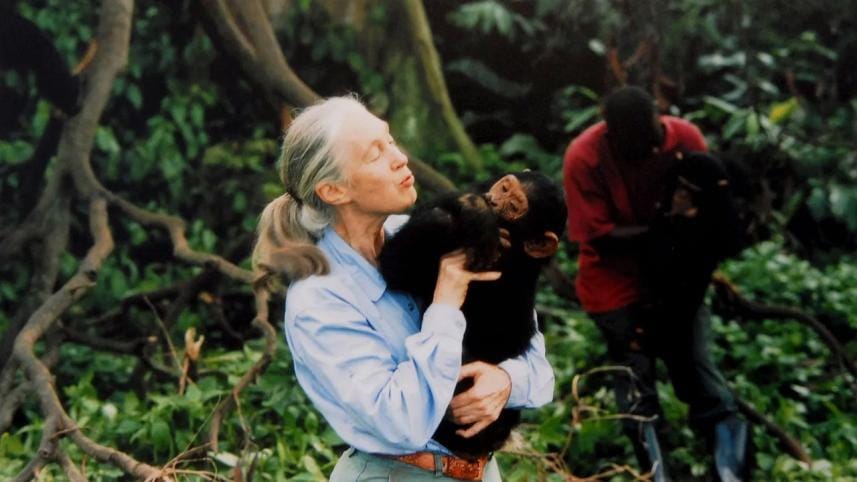Dear Jane, thank you

Jane Goodall's death at the age of 91 feels like the canopy of the forest has lost its tallest, most sheltering tree. Her life was a revolution in science, in storytelling, and in the way humans see themselves in relation to the natural world.
In remembering her, we are reminded not just of one extraordinary woman, but of the power of patience, empathy, and relentless advocacy in reshaping our collective conscience.
Goodall was not born into the halls of academia. She was a young English girl who carried stuffed chimpanzees and dreamt of Africa. That dream, unconventional for the time, carried her to Gombe Stream National Park in Tanzania at the age of 26. There, with little more than a notebook and binoculars, she began the observations that would change primatology forever.
Her mentor, Louis Leakey, believed that studying chimpanzees could illuminate human origins. But what Goodall brought to the field was something more radical: the insistence that science did not require emotional detachment. She named her chimpanzees, recognised their personalities, and dared to suggest that animals have minds, feelings, and social complexities of their own.
When she documented chimpanzees fashioning sticks to fish termites out of mounds, she forced the scientific world to rethink one of its defining boundaries. Humans, it turned out, were not the only toolmakers. This discovery cracked open the pedestal we had placed ourselves upon. The line between "us" and "them" blurred.
SHAPING A NEW SCIENCE
Goodall's methods were dismissed at first. Female, young, without a degree, and more interested in relationships than raw data, she was a target for academic condescension. Yet she persisted.
By the time Cambridge awarded her a doctorate in ethology – remarkably, without her ever holding an undergraduate degree – she had already built a case for the long-term, immersive, empathetic study of animal societies. Gombe became a living library, recording decades of chimpanzee behaviour, from maternal tenderness to violent conflict.
This was more than research. It was an ethical reframing of our place in the natural order. Goodall argued that animals were not "things", but individuals with lives worth living. In this, she anticipated and advanced conversations about animal rights, conservation ethics, and our responsibility toward the ecosystems that sustain us.
In 1977, Goodall founded the Jane Goodall Institute, ensuring her work would extend beyond one forest and one species. Over time, she moved from the quiet patience of observation to the loud urgency of activism, campaigning against habitat destruction, poaching, and the cruel use of chimpanzees in entertainment and research.
She was among the first major voices to link conservation with community, arguing that one cannot save forests without working alongside the people who live in and around them.
Her programme Roots & Shoots, launched in 1991, empowered young people across the globe to take on environmental and humanitarian projects. Today it spans over 65 countries, a living testament to her belief that hope is rooted in the choices of the next generation.
In an age when climate anxiety often feels paralysing, Goodall spoke of the indomitable human spirit, the power of young people, and the resilience of nature. To her, despair was not an option. She carried that message tirelessly, crisscrossing the globe well into her later years, delivering lectures, writing books, and calling on governments, corporations, and individuals to act.
Her advocacy was not simply about chimpanzees – it was about interconnection. She argued that caring for animals and caring for people were not separate tasks.
Goodall's impact is everywhere. It is in conservation strategies that prioritise community involvement. It is in the countless scientists, especially women, who followed her trail into the forests. It is in classrooms where children learn to see animals as beings, not objects. It is in international policies that increasingly recognise the rights of animals and the necessity of preserving biodiversity.
But perhaps her greatest gift was emotional: she permitted us to care. At a time when science prided itself on detachment, Goodall modelled compassion as a methodology. She showed that love and rigour are not enemies, but allies in the pursuit of truth. Her life was proof that science could be not only about knowledge, but also about kinship.
Goodall's death is not just the end of a life. It is a challenge to the living. We inhabit a world where deforestation accelerates, species vanish, and the climate crisis intensifies. Her message was always that solutions exist – but only if we act, and act together.
She believed that every individual mattered, every choice mattered, every small action added up. Her life is a reminder that change often begins with one person who dares to look differently. From a young woman with no formal credentials watching chimpanzees on a hillside, she became a global icon who shifted how billions understand the relationship between humans, animals, and the Earth.
As we mourn Jane Goodall, we must also echo her determination. Her voice may be gone, but her words remain: that there is always a reason for hope, always a role for compassion, always work worth doing.
If we listen closely – in the rustling of forests, in the gaze of a chimpanzee, in the determination of young activists -- we might still hear her urging us forward.
One of our tallest trees has fallen. It is now up to us to ensure the forest she fought for continues to thrive.




 For all latest news, follow The Daily Star's Google News channel.
For all latest news, follow The Daily Star's Google News channel.
Comments